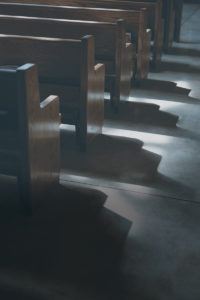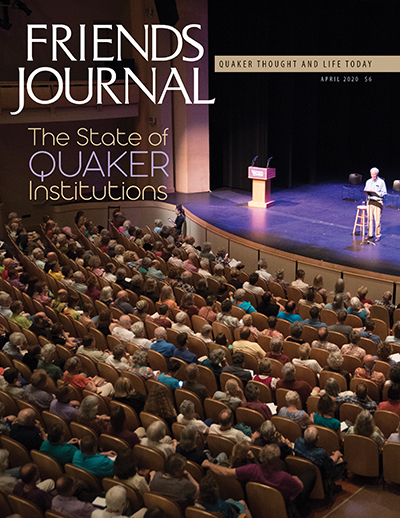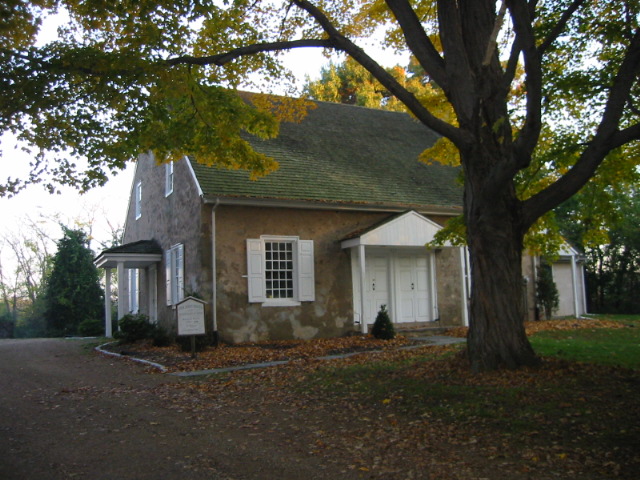
Originally published in the April 2020 issue
When Dorothy Grannell became clerk of Falmouth Quarterly Meeting in 2013, she realized that she hadn’t received the standard annual report from a few of its monthly meetings. Checking the files, she discovered one of them hadn’t reported in several years. Being a curious person as well as a diligent clerk, she decided to follow up and ask why not. The planning group of the quarter had already been concerned enough about the lack of participation that they had developed a visitation procedure. What she found was that this monthly meeting had not met regularly in several years. Upon further investigation, she learned there were only two remaining members still alive, neither of whom lived in the area anymore. The last clerk of the meeting had become a member of another local church. He was able to show that he had cared for the remaining finances, library, and records responsibly; he just didn’t notify anyone about the process. The final remaining member was encouraged to transfer his membership, either to a meeting closer to where he now lived or to another monthly meeting in the quarter. Then, over several months, the quarterly meeting officially laid down the monthly meeting, which had ceased to exist for all practical purposes long before this formal process.
When Dorothy accepted the clerkship of the quarterly meeting, it certainly wasn’t clear that this was part of her responsibilities. However, she didn’t just shrug and pass the list of nonresponsive meetings on to the next clerk. Instead she named and addressed the challenges of the situation:
Our reluctance to face conflict and unmask truth to help a healing process is a major barrier to the health of our meetings. If quarters were more active, we might not be losing meetings. Falmouth Quarter has lost two of our six meetings in five years. We were either afraid to confront a conflict situation or were not doing pastoral care of meetings we were not seeing or hearing from. Vigilance, paying attention, and truth-telling are all part of the testimonies of community and integrity.
Have you heard of situations like this before? I hear these stories all over the country, across all the branches of Friends, and God has laid it on my heart to share them, not as a professional but as a Friend: I believe that an extraordinary number of Quaker meetings and churches are not going to survive the next decade. I don’t have exact statistics, but I don’t think this is really news. The real question I have is how will we (meaning the whole Religious Society of Friends) care for the monthly meetings that will not be continuing?
The real question I have is how will we care for the monthly meetings that will not be continuing?
I started sharing this concern with other Quaker leaders a couple of years ago. For every story I hear about how a meeting that had dwindled to oblivion was revived by just one person moving there, I hear three others about an abandoned burial ground that has to be reclaimed and then sold to the local municipality, or the financial loss of money invested in a meetinghouse where nobody meets, or a fight over a meetinghouse property between siblings or cousins that is never reconciled.
Quaker leaders often think we don’t have enough time, energy, or money to deal with the living and growing meetings, but the weight of avoiding the frail and dying meetings among us also takes a toll. The “faithful remnant” is a narrative that is valuable and inspiring to many people. Yet it can be a story we hide behind to avoid hard conversations. We have to stop fooling ourselves that miraculous stories we’ve heard are going to be repeated in other cases. The demographic trends of rural locations and the growth, decline, and spread of cities are forces beyond the control of the Religious Society of Friends. And the cost of trying to resolve financial, legal, and pastoral issues after-the-fact is higher than dealing with them in good order.
Facing the existential questions sooner rather than later is one of the core purposes of religion and of religious communities. From the early days of the Religious Society of Friends, Quakers have offered practical advice about preparation for death. The yearly meetings of Pennsylvania and the Jerseys wrote this (paraphrased) epistle in 1694 and 1695:
Make provisions for the settlement of all outward affairs while in health, so that others may not be burdened and so that one may be freed to live more fully in the Truth that shall stand against all the entanglements, distractions, and confusions of our times.
Over the last 50 years, the hospice movement has been a healthy counterbalance to our society’s long-standing aversion to talk about death as well as to the increased medicalization of the end of life. I think the people who have been actively involved in the hospice movement have a lot to teach us.

We can learn to talk openly about the end of life with dignity, love, and respect for the life that has been. The hospice movement pays deep attention to people living their best lives in what time remains. But it also assists with resolving legal and financial issues before the end arrives and with providing pastoral care for the caregivers.
Carl Magruder, a hospice chaplain in California and a Quaker, says that for human beings, dying is inevitable, but it doesn’t have to be horrible. He outlined for me some of the important questions for opening this conversation: What is your understanding of what is happening here? What do you hope will happen? What do you want to happen next? Another question that I have heard from Friends with experience in this area is: what do you want your legacy to be?
We can learn to do this gracefully. The life cycle does not just affect individuals. Institutions of all sizes also come into existence, serve a purpose, and sometimes come to the end of their faithful service. Unsurprisingly, our books of Faith and Practice also have practical, procedural advices for the setting up and laying down of monthly meetings.
In many yearly meetings, it is the responsibility of the quarterly meeting to lay down a monthly meeting. But in many places, the quarterly meeting structures have atrophied so they may not have the capacity to handle all the issues envisioned in Faith and Practice. Even where the quarterly meeting is still functioning, its clerk probably didn’t sign up for that amount of labor and unresolved conflict.
So it may be that the yearly meeting should coordinate the provision of legal aid and pastoral care. Philadelphia Yearly Meeting’s Property Committee learned about a burial ground in the state of Maryland that had been abandoned after the monthly meeting closed more than 100 years before. The yearly meeting was still legally responsible for the property, but the local township had a much stronger interest in maintaining the site. The resolution was that the yearly meeting paid to erect a fence around the portion of the lot where the graves were, then conveyed the entire lot to the township. The town now maintains the lot as a peaceful public park and is responsible for mowing the grass and maintaining the fence. This is a positive outcome all around, but it took a lot of work on the part of a few people, both paid staff and volunteers, from the yearly meeting to sort it out. However, their example may be useful to other Friends who encounter similar issues.
Wilmington Yearly Meeting and other Friends in the state of Ohio are the beneficiaries of research done by Tom Hill, a lawyer and Quaker historian, who tracked down all the meetinghouses and other real estate property ever owned by Quakers in the state. Because of this work in the 1990s, Wilmington Yearly Meeting has current records of all the property in its legal care. Hill has published research on all the meetings in North America which is ongoing and freely available to Friends. It doesn’t have all the deeds in other states, but it is a great place to start if it’s been determined that someone in a yearly meeting ought to know the answers to these questions.
The pastoral care requirements for those Friends who are the last members of a dying meeting will be enormous. These Friends, often stubborn personalities, are often carrying the weight of generations of commitment to a building; a graveyard; a name; or just the memories of the meeting, the town, or their family. Sometimes someone from outside the group has to name the situation and ask: “What is your understanding of what is happening here? What do you want the legacy of this meeting to be?” One way to start is by asking the last few members of a meeting who they want to organize their memorial meetings. We can talk about writing a memorial minute or holding a memorial meeting for a monthly meeting, so that the stories can be told, the lessons learned, and the grieving honored.

I don’t wish to hasten the death of the Religious Society of Friends or of any particular meeting. I spend most of my time working to help Quakers and Quaker meetings and churches thrive in the twenty-first century. I am an active member of a local meeting. I travel widely among Friends. I frequently talk with leaders of Quaker institutions across all the branches of Friends. And I believe that the world needs what Quakers have to offer.
However, I am serious about acknowledging that a monthly meeting that consists of fewer than five people or that doesn’t meet weekly for worship or monthly for business is already not fully functioning. A meeting that cannot imagine itself taking in new members or caring for a wedding is already not capable of carrying on all the functions of a monthly meeting. If there is property involved, then the critical mass number is much higher. If the remaining active members are all over the age of 70 or 80, they won’t be able to continue to pretend much longer. They may continue to worship together as often as they are now, with joy and faithfulness and mutual support, but their memberships should be transferred to a larger, more stable monthly meeting. The arrangements for any property or other assets they hold should be made as soon as possible. Some of this may be clearly stated in Faith and Practice or in the incorporation documents of the meeting. Just as writing a will or estate plan or an advance directive for healthcare doesn’t hasten death for an individual, writing an end-of-life care plan for a meeting does not contribute to its demise. Like with childbirth, we don’t always get what we plan for, but if we know what our options are, share our hopes with our loved ones, and put it in writing, we are more likely to get more of what we want. The time and money and emotion required to make an end-of-life care plan for a meeting are less than the cost of resolving matters after the fact.
We don’t always get what we plan for, but if we know what our options are, share our hopes with our loved ones, and put it in writing, we are more likely to get more of what we want.
Friends at quarterly and yearly meetings also need to assess if the remaining people at a monthly meeting are still capable of making competent decisions. Or has it gone too far?
A few years before my father’s death, I had a painful though common experience. My sister and I had to tell my father that he couldn’t drive anymore. We had to say it more than once, and we had to support my mother’s enforcement of it when my sister and I were not present. She really didn’t want to drive him around; they had always done it the other way. It was really hard for all of us. I had to say, “You can’t do this thing that you used to be really good at anymore. Your judgment isn’t working as well as it used to. I know you don’t want to hear this, but it’s my job to say it.” The risk of him hurting someone else was too great.
Likewise, in some cases, facing the hard truth will require the assertion of responsibility and authority by the quarterly and yearly meetings, which is very difficult for some. But like taking the car keys from your elderly father when it is no longer safe for him to drive, it has to be done. The damage that will happen if we don’t lay down a meeting is less immediately life-threatening than an out-of-control automobile, but it can be time- and money-consuming. It’s necessary to retrieve the meeting’s records before they are discarded along with the rest of the contents of the garage, to identify where account numbers are kept, who has the key to the safe deposit box, and who has the copy of the deed. There is a continued liability risk for people injured on abandoned properties.
Some cautions need to be in place. Attention must be paid to the temptations to take control of other people’s assets for less than altruistic reasons. Friends are not immune to old rivalries, pettiness, and the distractions of wealth, racism, and sexism. So a broader attention to this question is healthy and may prevent benign neglect turning into malignant caregiving.
Facing how many monthly meetings will not survive the next decade is a daunting task, but knowing you are not alone in facing the existential questions is one of the reasons for the existence of religious communities.
So who will help yearly meeting leaders start talking about this with more honesty and less anxiety? This is not a one-size-fits-all situation. Here are some suggestions I can think of to help. I invite others to come up with more.
- Friends who have gone into hospice chaplaincy could serve as a resource for developing language and procedures for the various stages of grief and release.
- Yearly meetings in the same state could share information about their state’s legal requirements for the transfer of assets.
- Pastoral care resources developed in each branch of Friends could be shared with other yearly meetings in the same worship tradition.
- There could be a network of Friends who feel called to this work to know and support one another across geographic and institutional boundaries and to collect anecdotes and examples of processes that work or don’t work.
- The associations of yearly meetings could be a support to the yearly and quarterly meeting leaders who will have to face situations that have been decades in the making.
There are also resources we can turn to in this work:
- The Quaker historical libraries publish best practice recommendations for archives, including electronic records of minutes, etc., for example, swarthmore.edu/friends-historical-library/donating-to-collections.
- New England Yearly Meeting just published an expanded section titled “Dying, Death, and Bereavement” in its Faith and Practice.
- New York Yearly Meeting’s Aging Resources, Consultation, Help (ARCH) program provides support for yearly meeting Friends in their journey of growing older as a community: nyym.org/content/arch.
- Tom Hill’s index of monthly meetings in North America is available at quakermeetings.com.
This is going to be hard work. Beginning a conversation about the end of life is always difficult, whether for an individual or an institution. Perhaps more miracles will happen as we take responsibility for the facts of life. Facing how many monthly meetings will not survive the next decade is a daunting task, but knowing you are not alone in facing the existential questions is one of the reasons for the existence of religious communities. Doing even some of this work now will release more energy for the growth and faithfulness of Friends in the rest of this century, but only if we start talking about it now.




What happens when the quarterly structure has broken down? I live in a Quarter that consists of 4 Meetings and 1 worship group. I have lived in this quarter for my entire adult life and my impression is that of weakness. It is not unusual for a Monthly Meeting to send no one to Quarterly Meeting. I have noted that sometimes there is counter-programming at Monthly Meetings such as holding a Business Meeting on the same date as the Quarterly Meeting. A senior citizen reluctantly served as clerk of the Quarter. She asked for assistance from a younger member and that request was not addressed in a timely manner. Attendance at Quarterly Meeting has declined as older Quakers can no longer make the trip due to ill health or infirmity. Numerous times a children’s program would be planned and advertised only to have no child from another Meeting attend. I seldom attended Quarterly Meeting hosted by other Meetings as a young parent, since I did not know what was planned for the children, if anything. One of the Meetings is facing declining membership and discussing selling their Meeting House. But in such a situation, I doubt the Quarter will be able to assist in this process. Thanks for addressing this painful topic.
Dear Friend Eileen, I have attended at Camden and felt very welcomed. I am a nominal clerk at Appoquinimink Preparative Meeting in Odessa, DE, which is under the care of Wilmington MM which is suffering greatly from the decline in numbers and increase in ages of members. Camden is in Southern Quarter as is Chester River MM, Chestertown, MD, where I was accepted into the Religious Society of Friends. I seem to find myself living in locales at a distance from monthly meetings. We summer on an island in Penobscot Bay, Maine. I have found numerous Quakers also enjoying their second homes on Vinalhaven. I would love to initiate a worship group there. I see you are in the Lewes-Cadbury Worship Group. I wonder how that was started and is it thriving? We stopped there one First Day and were welcomed. Your comments are spot on for the issues that seem universal among the mid-Atlantic MM’s. Please feel free to contact me: I live in Delawre City, DE. kateinmaryland@atlanticbb.net
Thank you for writing so thoughtfully about a subject I’ve never considered. You pulled together practical suggestions along with sharing wisdom.
I enjoyed reading this article. It breaks my heart but I also have seen this happening in Quaker Meetings. I’m glad that someone wrote so openly about the subject.
I am grateful to the author for placing this important, broadcast, invitation here. I’m drawn to conversation with others about this subject, and how it applies locally (S.E. PA). If “nudged” alongside others, I’d be part of researching, envisioning, considering, communicating. My email address is available through the Phila Yearly Meeting directory; if an interest group is formed, I’d welcome a notification.
Thank you for a timely and needed article. The author lifts up a difficult topic that needs to be addressed. The practical suggestions are very helpful and the way she cautions us to examine our own motivations when addressing these issues is important.
Thank you for your reasonable, honest assessment of a difficult situation facing many other denominations beyond the Friends. I have facilitated the closing of a church where the congregation had ‘limped along’ for several years paying bills from collection plate to collection plate, unable to afford consistent pastoral leadership. The membership gradually dwindled down to 15 of the faithful, all but one over 80 years old. The end when it came was very painful for all involved because nobody was willing to see what was happening nor to ask for help.
I am a Baptist pastor,retired. I enjoy reading the Quaker Journals.
Starting in 1970 I was faced with the gradual decrease in Sunday night services. In the.church I pastored before retirement I had declines in attendance in our prayer meetings. This was most disturbing to me. The Sunday school was in decline because of young families wanting to sleep in. This meant people were no longer meeting to study the Word of God except, 20 min Sunday a.m. our denomination ( in Canada) The denomination shut down area Association meetings quarterly because of lack of attendees.
Outcome- Less connection. Prayer vanished. Does this make sense,with you? We, need a Christian awakening..Lord,, revive US again.
Ive heard a lot of young quakers say these things, many who had profound ideas on the next steps for the RSoF. a lot of them were pushed out or find quakerism in truer ways outside of our meetinghouses. We must accept that we are a colonizer religion on stolen lands and let our religion pass. The Light will persist, with or without us
I too recognize that Quakers are receding in number very rapidly. Young people are all moving away from the centuries-old religions and excuse my saying so, the fairytales. In this age of scientific developments, global communications, the internet, planes, modern medicine, space explorations, etc. it is difficult to convince young people that there is a god who created the heavens and earth in six days and that he is all-knowing and omnipotent. Young people are smart and full of energy and goodwill. See how they embraced the environmental cause; see how they embraced other cultures and people.
However, despite all our advances, the world still faces multiple problems, worst of all are wars, famine, overpopulation, pollution, gender violence, injustice, etc.
Quakerism as a faith cannot address present-day problems, however, Quakerism as a way of life does, and does so well: Pacifism, friendly persuasion, acceptance of others. equality, justice, integrity, simplicity, tolerance, sustainability. Quaker way of life can rectify and prevent many of the current world problems and could lead to a happier world. Even our silent worship is a form of contemplation and meditation that is essential to spiritual rather than religious growth. Besides, silence is wonderful for making wise decisions.
In my mind, for Quakerism to thrive, it must have a worthy cause, it must appeal to and attract the young people into its folds. World peace, sustainability, equality, and corruption can all find a solution in the Quaker way of life.
Monthly Meetings should adopt one (or more) local or global problem and the meetings for worship should become meetings for coming together as a team to resolve that problem. Small meetings can join effort with other small meetings, and even other non-Quaker groups with similar causes. There are so many worthy causes and so much that we can do together, both young and old.